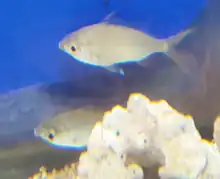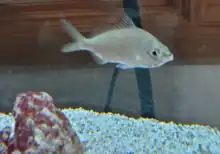Eucinostomus havana
Eucinostomus havana commonly known as the bigeye mojarra, is a widespread species of fish found from South Florida and the Caribbean west to the Gulf of Mexico and as far south as the Eastern coasts of Brazil. It dwells in brackish water, favoring shallow mangroves less than 10 m (33 ft) deep.[2] It stalks sandy grounds with vegetation and feeds on invertebrates. Mojarra are of little food value, but may be processed into fishmeal.

Bigeye mojarra in tank
| Eucinostomus havana | |
|---|---|
 | |
| Bigeye mojarra (Eucinostomus havana) | |
| Scientific classification | |
| Domain: | Eukaryota |
| Kingdom: | Animalia |
| Phylum: | Chordata |
| Class: | Actinopterygii |
| Order: | Perciformes |
| Family: | Gerreidae |
| Genus: | Eucinostomus |
| Species: | E. havana |
| Binomial name | |
| Eucinostomus havana (Nichols, 1912) | |
References
- Fraser, T.; Gilmore, G. (2015). "Eucinostomus havana". IUCN Red List of Threatened Species. 2015: e.T195883A2429273. doi:10.2305/IUCN.UK.2015-2.RLTS.T195883A2429273.en. Retrieved 8 April 2022.
- Randall, J.E.; Vergara, R. (1978). "FAO species identification sheets for fishery purposes. Western Central Atlantic (Fishing Area 31)". 2.
{{cite journal}}: Cite journal requires|journal=(help)
This article is issued from Wikipedia. The text is licensed under Creative Commons - Attribution - Sharealike. Additional terms may apply for the media files.
